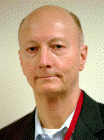September 24, 2007 Article Latest Between The Lines Article Between The Lines Archives:
Tennis Server
|

 |
by Ray Bowers
The wonder of Tennis Channel and Versus Channel brought recent late-round Davis Cup action to watchers here in America. Both favored nations advanced in semi-final play, September 21-23, 2007. A strong U.S. team defeated Sweden in Gothenborg, and the Russians in Moscow defeated Germany by an unexpected script. Both meets were well contested but both were marred by sicknesses sidelining one or more principals on the third day. Both were conducted with high sportsmanship among the players, an absence of acrimony, and plenty of enthusiasm by the watchers. Electronic line-call systems were absent. Such a system was not needed on the Moscow clay but was missed in Gothenburg. RUSSIA 3, GERMANY 2 The red clay court inside Olympic Stadium, Moscow, seemed heavy, the bounce on the slow side. Conditions called for heavy doses of topspin, speeding up bounces that might otherwise invite an opponent's attack. In the first match the player with the right medicine was Moscow-born Igor Andreev, 24, whose backhand two-hander and frying-pan-grip on the forehand seemed to produce effortless topspin. His firm and consistent shots, directed with unrelenting accuracy, seemed to fly forward off the bounce. His opponent, Tommy Haas, who ranked much higher in the year-to-date points race, was the lesser player this date from start to finish. Andreev d. Haas 62 62 62. Russia 1, Germany 0.
Slightly favored in the doubles was the Russian pair--the reliable Youzhny and the free-spirited, hard-hitting Tursunov. Both were highly ranked as singles performers, though both had competed in doubles fairly regularly. On the German side was Alexander Waske, 22, who had been on the winning side in six of his seven past Davis Cup doubles matches. Waske's first-time partner, in his first Cup appearance, was Bayreuth-born Philipp Petzschner, 23. The Germans won the first set, the Russians won the second and thus had the momentum going forward. It gradually became evident that neither Russian player was a natural doubles artist. Youzhny usually stayed on the baseline after delivering either a first or second serve, and it was his serving games that were most vulnerable. Tursunov, on the other hand, had a tendency to seek winners outright, usually using extra power. His boldness produced some superb successes but also an unsatisfactory number of avoidable errors. Meanwhile it was Petzschner who became the strongest player on the court, showing excellent doubles instincts and comparable racket skills. In the third and fourth sets, both sides had several service-break opportunities, but neither could convert so that both sets went to tiebreakers. When partner Waske hurt his elbow in the third set and thereafter served with reduced power, the burden fell on the Cup rookie, who responded well. Oddly, the slow velocity of Waske's serves seemed to bother the Russians, especially Youzhny, and the Germans captured both tiebreakers to collect the win. Petzschner-Waske d. Tursunov-Youzhny 63 36 76 76. Germany 2, Russia 1.
It was assuredly no mismatch. Petzschner performed well, showing firm serving, excellent court movement, and a willingness, indeed inclination, to come to net. But net was not especially the place to be on this clay surface. The newcomer made it interesting, and there were many wonderful points to please all watchers. But Youzhny's strong, all-court play produced a convincing four-set win. Youzhny d. Petzschner 64 64 36 63. Russia 2, Germany 2. The fifth and deciding match-up brought together the heros of the first day, Andreev and Kohlschreiber. Again the dominating element as play unfolded was the extreme topspin of Andreev, not only on his groundstrokes but especially in his commanding serve. The sheer energy of Igor's hitting kept Kohlschreiber at disadvantage, and although the score stayed always close, too often the German player failed to return one of Igor's blows even from good hitting position only because of the potency of Igor's overspin and velocity. Philipp held his composure, however, and captured the second set off a momentary weakening of Igor's consistency and a hard-to-believe serve-return winner of surpassing splendor at break point. Andreev's dominance resumed with consecutive service breaks early in set three. But early in the fourth set, some of the thunder again faded from the Russian's bombardments. But the respite for Philipp was only temporary. The heavy blows soon resumed, sometimes causing causing Kohlschreiber's swing to be a shade late and his shot to drift across a sideline. The games were now often reaching deuce, sometimes repeated deuces, a rarity earlier. Kohschreiber began feeding his opponent a diet of short, low-bouncing balls to the backhand, carrying heavy slice, a tactic which often produced winning points for the German. But it was not enough. Andreev reached match point at forty-love, and though a few more minutes would be needed, he finally closed out matters not by caution but by again combining weight and accuracy in attack. Andreev d. Kohlschreiber 63 36 60 63. Russia 3, Germany 2. If the expected nation had triumphed, the process had scarcely been what most observers had imagined. U.S.A. 4, SWEDEN 1 Over the preceding several decades the Swedes had defeated visiting American teams at the Gothenburg Scandinavium three times without loss. I watched the current matches at that arena several hours after their completion, generally after watching the simultaneous events in Moscow as they happened. Andy Roddick and Joachim Johansson provided a match-up of two players both of whom were superior servers and ordinary serve-returners, locked together on a fast indoor surface. The result was play almost wholly dominated by the serving. The two had met three years earlier, at U.S. Open, where the Swedish player won, enroute to a ranking in the world's top ten. Injuries, mainly to the shoulder, had limited Joachim's competitive play since then. Indeed Joachim had not played a tour match since January 07. There were no service-breaks for the first two sets. Only rarely did a point last more than two or three racket-strikes. In the sixth game of the match, Joachim faced love-forty, but he promptly delivered three untouched service aces followed by an unreturned near-ace and yet another ace. Meanwhile Andy when serving faced only one break point.
The Taraflex hard-court "carpet" was ideally suited for side-sliced serves, where the ball skids on the surface and then bends to receiver's right as it slows. In the second match, Thomas Johansson used sliced serves regularly, especially to the James Blake forehand. His serving, along with some effective attacks on James's second serve by compact counterpunches, plus Thomas's highly reliable backhand two-hander and some fine approaches off a heavily overspun forehand, enabled the lower-ranked Swede to keep ahead of his opponent. Johansson broke serve to open the first set and held to that edge to set's end. He broke again early in set two behind two winning serve-returns and some dismal play by James and again held on. Blake took the third set behind his finest play of the day. But he slipped backwards in set four, losing serve from deuce in game four by contributing two consecutive double-faults. His total of double-faults for the match to date thus became eleven, compared to only one by Johansson. The double-faults reflected the Swede's relentless pressure threatening James's second serve. One final hope arose when James reached 15-40 on Thomas's serve in game seven. But James then failed to get any of the next four serves back into play. T. Johansson d. Blake 64 62 36 63. U.S.A. 1, Sweden 1. The second-day doubles was played at extremely high level--not surprisingly given the credentials of the participants. Facing the world #1 pair, the Bryans, were Simon Aspelin, recent doubles champion at U.S. Open, and veteran Jonas Bjorkman, nine-time Slam winner in men's doubles. The first set was tight, all players adjusting to the problems of returning serve on the fast Taraflex. Bob Bryan's lefty slices were especially tricky. In the seventh game, Bjorkman served and first-volleyed poorly, but the Swedes managed to survive five break points. In most other games, all servers held serve quickly. The tension soared in the set-ending tiebreaker, where each side obtained only one point on the opposition's serve until the point score reached 11-12. The set ended on the 24th point, when a fine return by Bob Bryan of an Aspelin second serve produced the deciding error. It was the brothers who thereafter gradually stepped up the consistency of their serve-returning. Increasingly, points were decided in close-in exchanges, many of them wonderfully exciting to watch. Teamwork in movement between the partners came often into play, where the Swedish partners were good but were less familiar with each other than were the Americans. Occasional errors or weak returns could be traced at least partially to their less-instinctive play. Moreover Aspelin was handicapped in returning serve from the right side--not his usual station. The Americans never lost a serving game, though the Swedes failed to obtain a deserved service break because of an incorrect line call early in the second set. Bjorkman continued to make countless superb plays in forecourt, but his serve was the least forcing of all four. The Swedes lost four serving games in total, all when Jonas was serving. As the match lengthened, the dominance of the brothers continued to grow. Bryans d. Aspelin-Bjorkman 76 62 63. U.S.A. 2, Sweden 1. Thomas Johansson had played at his highest level on Friday. His chances seemed about equal to defeat Roddick in their scheduled meeting on Sunday. But sudden illness intervened.Thomas's replacement, Jonas Bjorkman, now 35, had once been among the world's top players, having reaching world #5 a decade ago, and had indeed scored some fine singles wins in 2007. Now, against Andy, Bjorkman showed that he can still hit crisply to the sides, can come forward and volley as well as anyone in today's game, and can compete tenaciously without letup. But Roddick on this day from the outset used well the right formula--one based upon Andy's strong serving and backed by excellent court mobility plus firmness and consistency in ground stroking. Andy tried few high-risk shots, content to apply steady, relentless pressure in his stroking. Jonas played well, especially in his excursions to net, but Jonas missed too many shots to take the lead. There was never doubt as to the final outcome. Roddick d. Bjorkman 62 76 64. U.S.A. 3, Sweden 1. U.S.A. will be the host nation for the final round against Russia. The two nations played last year in a semi-final meeting on clay in Olympic Stadium, Moscow. Safin and Youzhny won first-day singles matches over Roddick and Blake, respectively. Tursunov completed the Russian victory, defeating Roddick on the third day in a 17-15 fifth set. (Russia then completed its 2006 capture of the Cup by defeating Argentina in the final round, score 32, on a hard court in Moscow.) The final round will commence November 30 at a site to be chosen by the Americans. A nonclay surface is certain, probably indoors, with perhaps a sentimental choice in Fort Worth, where as a boy in 1992 Andy Roddick watched an American team defeat Switzerland to win the Cup. SUPERSTAR ROLES Participation by the superstars and near-superstars was good. The Swedes lacked Robin Soderling, who had been out since midsummer except for a first-round retirement in Canada. Injured Safin appeared on the third day in Moscow from a trip to the Himalayas. In the promotion-relegation play, which took place the same weekend at eight locations worldwide, Roger Federer led Switzerland in its 3-2 loss to Czech Republic. Roger contributed two singles wins but lost his doubles with partner Allegro after the pair won the first two sets against Berdych-Stepanek. (The Swiss #2 singles player, Stan Wawrinka, who won three matches at U.S. Open, was outmatched against the two higher-ranked Czech players aforementioned.) Novak Djokovic led Serbia into next year's World Group by defeating Australia with Hewitt. Andy Murray and brother Jamie joined Tim Henman in the British victory over Croatia. The high level of superstar attendance plainly contributes to the long-term health of the Cup competition and the sport in general. TENNIS NATIONS 07 Again this December, we will choose a pro-tennis Nation of the Year. Weighted heavily in the selection will be results in the pro team competitions and in the major tournaments. Here are the winners in the 2007 team events.
Davis Cup: Russia or U.S.A., to be determined Here are the leading nations at 2007 tournaments, measured by the number of singles and doubles matches won by players of each tennis nationality:
Men's tournaments:
Women's tournaments: Intangible aspects may also be considered in our selection, including success by a nation out of proportion to its size or past place in tennis history.
--Ray Bowers
1995 - May 1998 | August 1998 - 2003 | 2004 - 2015
This column is copyrighted by Ray Bowers, all rights reserved.
Following interesting military and civilian careers, Ray became a regular
competitor in the senior divisions, reaching official rank of #1 in the 75
singles in the Mid-Atlantic Section for 2002. He was boys' tennis coach for four
years at Thomas Jefferson High School for Science and Technology, Virginia, where
the team three times reached the state Final Four. He was named Washington
Post All-Metropolitan Coach of the Year in 2003. He is now researching a history
of the early pro tennis wars, working mainly at U.S. Library of Congress. A
tentative chapter, which appeared on Tennis Server, won a second-place award
from U.S. Tennis Writers Association.
Questions and comments about these columns can be directed to Ray by using this form.
|



October 2022 Tennis Anyone: Patterns in Doubles by John Mills. September 2022 Tennis Anyone: Short Court by John Mills. |
 You will join 13,000 other subscribers in receiving news of updates to the Tennis Server along with monthly tennis tips from tennis pro Tom Veneziano.
You will join 13,000 other subscribers in receiving news of updates to the Tennis Server along with monthly tennis tips from tennis pro Tom Veneziano. 

